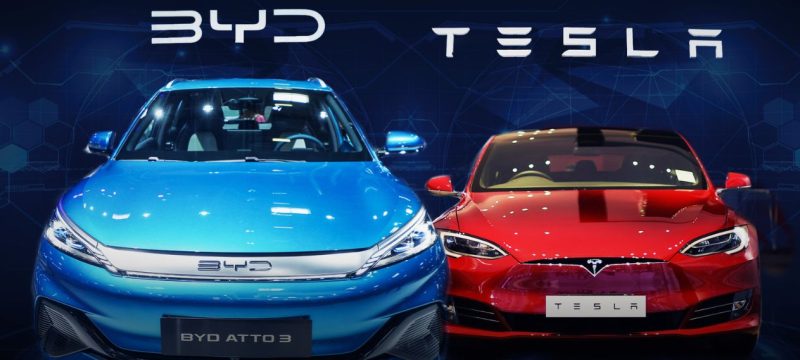Chinese electric vehicle (EV) manufacturer BYD has been gaining momentum, narrowing the gap with Tesla as it targets the top position in global EV sales for 2024.
The company saw a significant increase in sales, selling 207,734 EVs in December, bringing its total for the year to 1.76 million vehicles. This growth was driven by strategic discounts and government-backed subsidies, which BYD said attracted more customers. Overall, vehicle sales increased by over 41% compared to the previous year, with hybrid models contributing greatly to this growth.
Read more: Study Finds Teslas Have Highest Fatal Crash Rates Despite Safety Features
These strong results come just as Tesla prepares to release its quarterly earnings. While Tesla has historically led the global EV market, BYD has been steadily closing the gap, largely due to rising demand in China, its primary market, where it holds a 90% share of its total sales.
In Q3 2024, BYD reported a revenue of more than 200 billion yuan ($28.2 billion), a 24% year-on-year increase, surpassing Tesla’s quarterly revenue of $25.2 billion. However, Tesla still leads in total vehicle sales, holding a slight advantage in overall EV deliveries.

BYD’s success is primarily attributed to growing car sales in China, where intense competition has led to lower EV prices and government incentives promoting the transition to energy-efficient vehicles. The company has also benefited from expanding into emerging markets.
Despite this success, BYD has encountered challenges in gaining international market share. The European Union imposed tariffs as high as 45.3% on Chinese-made EVs, complicating access to the European market. Additionally, the U.S. has placed a 100% duty on EVs imported from China, with more restrictions expected under President-elect Donald Trump.
BYD has focused on expanding in developing economies, though it faced a setback in December when construction on its factory in Brazil was halted due to allegations of “slavery-like” labor conditions. The company has since severed ties with the construction firm involved and reaffirmed its commitment to adhering to Brazilian labor laws.
BYD’s rise highlights a significant shift in the global automotive industry, putting pressure on traditional car manufacturers to adapt to the growing EV market. Companies like Volkswagen, Honda, and Nissan are struggling to keep up with Chinese EV makers, which has led to talks of mergers and plant closures to stay competitive.
In contrast to the challenges faced by these legacy automakers, BYD’s growth underscores China’s increasing dominance in the EV sector, as it continues to outperform foreign rivals like Volkswagen and Toyota in its domestic market.









